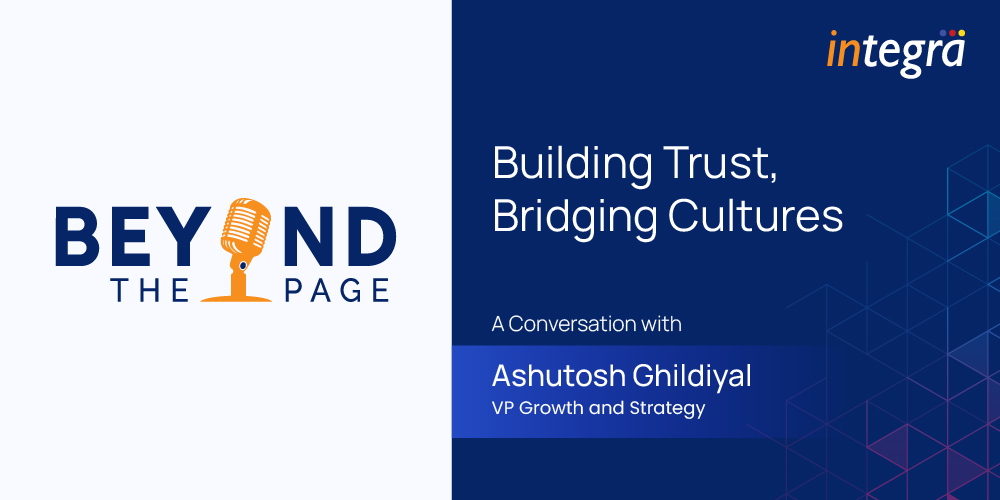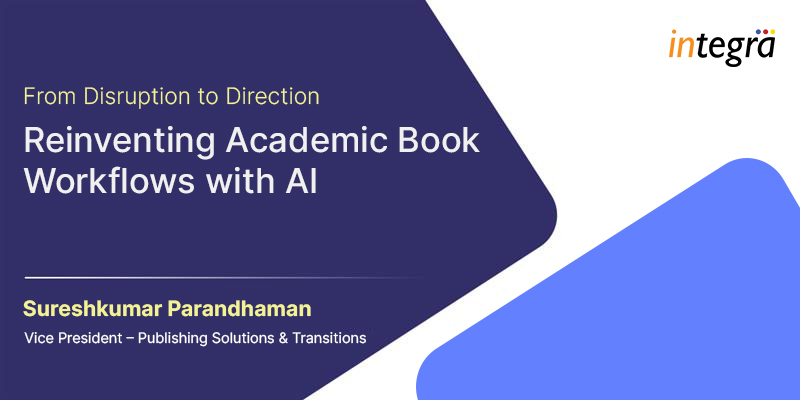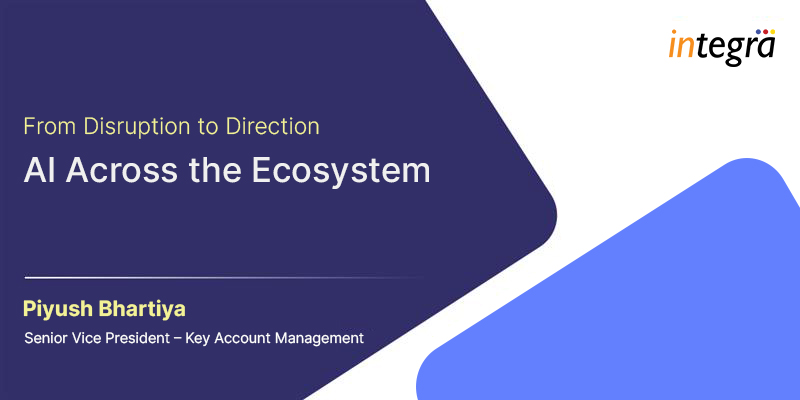Building Trust, Bridging Cultures – A Conversation with Ashutosh Ghildiyal

Beyond the Page
Thought Leadership, Insights, and Stories from the Heart of Integra
Welcome to Beyond the Page—a series that goes beyond the mechanics of publishing to explore the ideas, experiences, and people shaping the future of scholarly communication. In each episode, we feature conversations with Integra’s leaders and visionaries, offering their perspectives on innovation, purpose, and transformation. Tune in for insights straight from the minds driving our industry forward.
Featured Leader: Ashutosh Ghildiyal
Vice President, Growth and Strategy | Integra
Ashutosh Ghildiyal serves as the Vice President of Growth and Strategy at Integra, a global leader in publishing services and technology solutions. With over 18 years of experience in scholarly publishing, Ashutosh has been at the forefront of driving sustainable growth, spearheading international market expansion, and creating impactful solutions for authors, institutions, and publishers alike.
A recognized thought leader in scholarly communication, Ashutosh actively shapes industry discourse through his published articles, commentary, and speaking engagements. His expertise spans emerging trends in publishing, research integrity, author services, and the ethical use of AI in academic workflows. His writing provides both strategic insights and actionable frameworks for industry stakeholders.
At Integra, Ashutosh leads growth strategy, brand positioning, and innovation across upstream services, such as AI-powered manuscript screening, peer review solutions, and research integrity. His work combines deep domain expertise with a passion for cultural intelligence, enabling him to build trust-based partnerships across diverse geographies, including Korea, China, the United States, Saudi Arabia, and Japan.
Ashutosh also serves on several influential bodies, including the Board of Directors of ISMTE, the Asia-Pacific Advisory Council of ISMTE, the Steering Committee for International Peer Review Week, and the Advisory Cabinet of the Asian Council of Science Editors (ACSE).
Whether through strategic leadership or thought-provoking writing, Ashutosh is committed to advancing global scholarly communication with integrity, empathy, and innovation.
A Conversation with Ashutosh
Q: Ashutosh, with your extensive career across markets like Japan, China, India, and Saudi Arabia, what has been the most defining theme of your career?
A: If I had to distill it to one theme, it would be purpose. Early on, I realized that this industry isn’t just about delivering services—it’s about strengthening trust in research, empowering researchers, bridging linguistic and cultural divides, and making science more inclusive. This sense of meaning has guided me through every strategic decision, particularly in leadership roles focused on growth and innovation.
Q: You’ve worked in diverse cultures. How do you adapt your leadership and business development approach to these varying contexts?
A: The key is humility and curiosity. In Korea, relationships are built gradually and hierarchy matters. In the U.S., directness and speed are appreciated. In Saudi Arabia, trust and hospitality are foundational. Japan values precision and formality. I’ve learned to suspend assumptions, listen deeply, and lead with cultural intelligence. The more I approach a market as a learner, the more impactful I can be.
Q: How have these experiences shaped your leadership style?
A: They’ve made me more empathetic and intentional. From Japan, I learned punctuality and precision. From China, personal trust precedes business discussions. From Korea, I learned the value of being proactive. These insights shape how I build teams—blending empathy with execution, ensuring strategy is always human-centric.
Q: You’ve experienced both success and setbacks. How do you process failure?
A: Earlier in my career, failure felt personal. Now, I see it as data—feedback that helps you recalibrate. Whether it’s a misjudged market entry or a product that didn’t resonate, the real question is: what did you learn? I try to create an environment where it’s safe to fail early, experiment quickly, and learn continuously. Resilience is the key, not perfection.
Q: And how do you handle success when it comes?
A: I don’t dwell on it for too long. I celebrate wins with the team, then focus on what’s next. But I do take moments to express gratitude—towards those who made it happen and the journey itself. Success, for me, is when effort, values, and impact align. That’s worth appreciating.
Q: Many leaders experience impostor syndrome. Have you?
A: Absolutely. I still do. I see it as a signal—a reminder that knowledge and experience alone can’t offer a permanent source of confidence or momentum. It urges you to keep learning and pushing boundaries. Impostor syndrome exposes the uncertainty that comes from not knowing what lies ahead, and in doing so, it nudges you toward growth through action.
The voice that asks, “Do I really belong here?” can be persistent. But over time, I’ve learned that most people are figuring things out as they go. Confidence is built not by waiting, but by taking initiative—by creating things, building things, doing what no one asked you to do.
What’s also helped is letting go of the need for external validation. You begin to realize that everyone else is navigating their own uncertainties too. Seeking honest feedback—from colleagues, mentors, and even family—has been invaluable. It can be uncomfortable, even painful at times, but it’s essential if you want to grow.
Q: What personal practices have helped you stay grounded amid complexity and change?
A: Two things: cultural immersion and deep work. Wherever I’ve been, I’ve immersed myself in the local culture—learning the language, understanding customs, connecting with people. This makes work feel more human, less transactional. And I prioritize deep, focused work—no distractions. That’s when I think clearly and stay aligned with purpose.
Q: If you could give one piece of advice to early-career professionals in scholarly publishing, what would it be?
A: Don’t just aim for competence—aim for meaning. This industry lets you contribute to something bigger: the advancement of human knowledge. That’s a rare privilege. Lean into it. And don’t be afraid to step out of your comfort zone—growth often happens when you push your boundaries.
Q: In one of your articles, you discuss the challenges faced by peer reviewers, such as burnout and fatigue, and propose the PRISM framework. How do you see AI and immersive technologies playing a role in addressing these issues while maintaining the integrity of peer review?
A: Peer review faces significant challenges, including reviewer burnout and increasing submission volumes. The PRISM framework integrates AI and immersive technologies to alleviate these pressures, while preserving the intellectual rigor of peer review. AI tools reduce administrative tasks like citation checks, formatting, and plagiarism detection, allowing reviewers to focus on the manuscript’s quality and context. Immersive environments and AI-driven feedback systems encourage deeper engagement and more stimulating reviews.
However, the integrity of peer review must remain human. AI should assist with repetitive tasks, but critical analysis, insight, and nuanced judgment must stay with the reviewer. The PRISM framework aims to reduce cognitive load and make peer review more rewarding and efficient for both reviewers and the scholarly community.
Q: What do you mean by “gatekeeping” in scholarly publishing?
A: Gatekeeping in scholarly publishing refers to the process by which publishers and editors ensure that only research meeting high standards—clarity, validity, and relevance—reaches the audience. It’s about preserving the quality and integrity of scholarly work, ensuring that readers can trust the research they rely on.
Q: How can AI enhance the peer review process while maintaining human oversight?
A: AI can automate mechanical tasks like plagiarism detection and manuscript screening, which frees up reviewers and editors to focus on more critical aspects like understanding the research’s context and the author’s intent. While AI enhances efficiency, human expertise remains vital for maintaining quality, creativity, and integrity. AI should augment, not replace, human effort.
Q: How can a reader-centric approach address the challenges faced by scholarly publishing today?
A: The focus has shifted towards an author-centric model in publishing, which has led to challenges like low-quality research and increasing integrity issues. A reader-centric approach places value on delivering reliable, high-quality research to those who need it most. It ensures that content is meaningful and relevant, prioritizing evaluation over rapid publication. This shift would enhance scholarly ecosystems, reduce integrity concerns, and align authors’ goals with readers’ needs.
Q: With AI’s rise, will publishers still be needed in the future?
A: Absolutely. While AI can assist with tasks like manuscript screening and plagiarism detection, the core role of scholarly publishing—gatekeeping—remains human-driven. AI can handle routine tasks, but human judgment, critical thinking, and contextual understanding are irreplaceable. The future of publishing will likely be a hybrid model, where technology enhances human decision-making rather than replacing it entirely. Publishers will remain essential as the gatekeepers of trusted knowledge.
Q: What excites you most about your role at Integra?
A: I’m in “builder mode,” and that’s incredibly energizing. We’re shaping future-ready services across both upstream and downstream publishing—from submissions management and editorial support to peer review and research integrity. We’re also building strong, end-to-end publishing solutions. There’s tremendous potential to create value across functions, mentor emerging leaders, and turn ideas into impactful solutions.
Q: And finally, what excites you about the future of scholarly publishing?
A: Scholarly publishing will always be essential—because trusted knowledge will always be essential. While the formats and technologies may evolve, the core values of trust, relevance, validity, and the speed at which knowledge is shared will remain paramount. Neutral, third-party entities like scholarly publishers are uniquely positioned to uphold these values and bring together the many stakeholders in the research ecosystem.
At Integra, we’re not just responding to change—we’re helping shape the future. That opportunity to build what’s next is what truly inspires me.
Closing Thoughts
Ashutosh’s journey across continents and cultures highlights that leadership in scholarly publishing is about more than strategy and execution—it’s about empathy, purpose, and human connection. His commitment to building trust and embracing cultural intelligence reflects a leadership ethos that is as much about the people as the process.
As Integra shapes its path in upstream services for the global research community, leaders like Ashutosh exemplify the vision and authenticity needed to define the next chapter of academic publishing. Stay tuned for more conversations that go Beyond the Page—where we explore the ideas, people, and purpose powering the future of scholarly communication.
Recent Blogs

From Disruption to Direction: Reinventing Academic Book Workflows with AI

From Disruption to Direction: AI Across the Ecosystem


